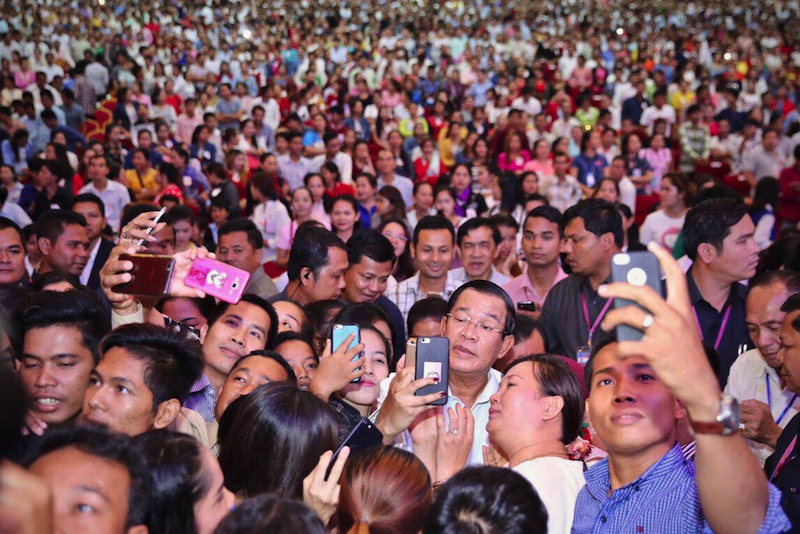In a move likely to play well with a large swath of voters ahead of next year’s national election, Prime Minister Hun Sen on Sunday announced a raft of new benefits for garment workers including a big bump to their monthly minimum wage—from $153 to “at least” $168.
Garment workers eager for higher wages figured prominently in the opposition CNRP’s mass public rallies both before and after the disputed 2013 national election. At least five workers were shot dead by security forces after a protest outside a Phnom Penh factory turned violent in January 2014.

The garment sector’s minimum wage has been rising steadily every year since then. Negotiations between the government, factories and unions to set next year’s wage are ongoing.
But Mr. Hun Sen pre-empted the conclusion of those talks in a speech to some 4,000 middle-management garment workers in Phnom Penh on Sunday. Media were barred from the venue, the convention hall on Koh Pich. But in a post to his Facebook page soon after, the premier announced that the new wage would be no lower than $168, about 10 percent more than what garment workers making minimum wage in the 700,000-strong industry earn now.
The prime minister also announced plans to make employers pay their workers’ full contributions into the National Social Security Fund as of January, instead of the 50 percent they cover now, and to let garment workers ride on Phnom Penh’s public buses for free for the next two years. Mr. Hun Sen said a pension plan for garment workers would start in 2019, a year later than had been planned by the Labor Ministry. He also told the Health Ministry to start building more referral hospitals closer to the factories.
Turning the event overtly political, Mr. Hun Sen insisted that the populist policies were not a reaction to the CNRP, which made higher wages for garment workers a pillar of its campaign platform in 2013, when it nearly defeated the long-ruling CPP.
“This raise is not because of the demands from the opposition party; it is the great effort from the royal government,” he said in his post. “Certainly it is only the CPP that changes everything to make Cambodia better.”
The prime minister also urged garment workers, many of whom leave home to live close to their factories, to vote where they work come July instead of heading back to their provinces. Because many of the factories are concentrated in and around urban areas, where the CNRP tends to do well, some political observers say that recent changes to election laws to let people vote away from home could help the CPP by concentrating opposition votes where the CNRP is already strong.
Workers leaving the event welcomed the promised raise and new benefits.
The government had billed the day’s event as the first in a series of meetings Mr. Hun Sen will hold with garment workers across the country both to reach them directly and hear their concerns. But attendees said the premier did all the talking.
“We could not express any opinions in the meeting, just attend and listen,” said Meng Kimhuot, a quality control officer at a factory in Phnom Penh.
Attendees were also reluctant to say how much they believed the new benefits were meant to secure their votes. “I don’t dare to talk about that,” Mr. Kimhuot said.
Ath Thorn, president of the country’s largest independent union, the Coalition of Cambodian Apparel Workers Democratic Union, said plans to give garment workers a pension and to save them from paying into the National Social Security Fund would help.
But he said the new minimum wage the prime minister announced was still too low and that he would continue pushing for more in the negotiations. He and some other union leaders want a minimum wage closer to $200 to match what they say most garment workers tend to spend in a month. Though Mr. Hun Sen’s policy pronouncements tend to have the force of law, Mr. Thorn refused to believe that the new wage was a foregone conclusion.
He had no doubts about the politics behind the raft of new benefits but could not tell how effective they would prove.
“I think this time the prime minister tries to play this role to help the worker…because they want support from the workers,” he said. “If this one is good enough, they will support. If it’s not good enough, they will not support.”
Ken Loo, secretary-general of the Garment Manufacturers Association in Cambodia (GMAC), which represents most factories, said the new wage was in line with recent trends.
“It’s not totally unexpected, because if you look at the last three years it’s been about 10 percent, so it’s not extraordinary,” he said.
But the raises of the past three years have been a dramatic change of pace for the garment sector, and GMAC says its factories have been struggling to stay competitive in the absence of a complementary rise in the productivity of their workers. And while garment exports continue to grow year-on-year, that growth has slowed. The World Bank and others have attributed the slowdown, and a more modest outlook for the sector, at least partly to the rising wages.
Mr. Loo said the prime minister must have some economic rationale for the new wage. But he said the pace could not continue and hoped the government would be announcing other policies to help soften the blow on employers. For one, he said factories were hopeful that the suspension of a 1 percent advance profit tax, frozen since 2008, would be renewed.
As for the new raise, he said, “hopefully it’s the last time it’s this big.”



